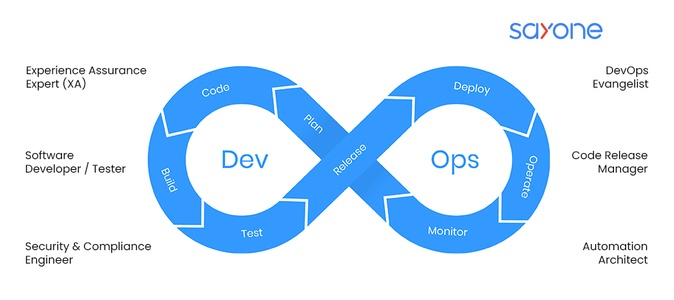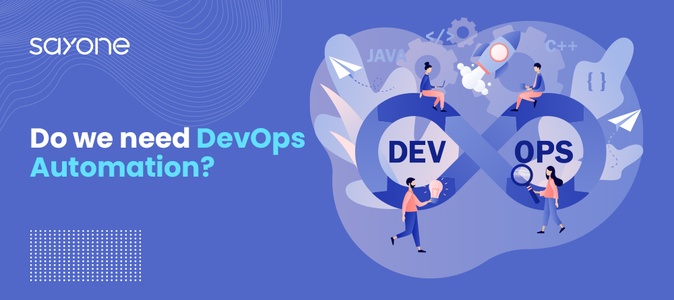DevOps Team : How to Build One? Roles & Responsibilities

Share This Article
Do we need DevOps automation?
Table of Contents
Subscribe to Our Blog
We're committed to your privacy. SayOne uses the information you provide to us to contact you about our relevant content, products, and services. check out our privacy policy.
What is DevOps? Definition and Core Principles
DevOps is a collaborative approach bridging the traditional gap between software development (Dev) and IT operations (Ops). It aims to accelerate the delivery of software, ensuring faster releases, better quality, and improved responsiveness to business needs.
Core Principles:
- Collaboration: Instead of working in silos, both developers and IT teams come together. This integration fosters open communication, paving the way for quicker problem-solving and innovation.
- Automation: Automating manual processes speeds up delivery and reduces errors. From code integration testing to deployment - automation plays a crucial role.
- Continuous Feedback: Regular feedback loops ensure product improvement. Teams keep an eye on the performance and promptly address any arising issues.
- Infrastructure as Code (IaC): Treating infrastructure similarly to software code means systems and networks can be quickly set up, scaled, and replicated.
- End-to-End Responsibility: From the idea's inception to the end product, responsibility is shared. This guarantees quality and prompts teams to be proactive in addressing issues.
For businesses, adopting DevOps means getting ahead of the competition. With swift releases, reduced downtimes, and continually improving products, firms can meet ever-evolving customer demands and ensure business growth.
Why Build a DevOps Team?
Building a DevOps team has become a necessity for modern firms. In an era where technology drives success, a DevOps team ensures streamlined operations, offering the synergy of development and IT operations. This collaboration reduces deployment times, minimizes errors, and boosts product quality.
A dedicated DevOps team brings together a variety of experts, from developers to infrastructure architects, focusing on a unified goal: delivering superior products faster to meet customer demands. Their combined expertise allows for quicker troubleshooting, ensuring minimal downtime and fostering a culture of continuous improvement.
Is Outsourcing DevOps Beneficial?
Outsourcing, on the other hand, presents a golden opportunity. When firms outsource DevOps functions, they access a wide pool of experts without the overheads of hiring full-time employees. This provides flexibility, reduces costs, and ensures that firms remain updated with the latest best practices in DevOps.
Learn More about Outsourcing DevOps: What are the Pros & Cons ?
Advantages of Having a Specialized DevOps Team
When organizations decide to pivot to a DevOps approach, they often grapple with whether to have a specialized team in place.
Here's why investing in a dedicated DevOps team can be transformative:
- Consistent Delivery: A specialized DevOps team ensures regular and consistent product delivery, minimizing the time from development to deployment.
- Optimized Collaboration: With roles like the DevOps Engineer, teams experience better communication and fewer silos. This promotes an environment where development and operations work in tandem, improving overall efficiency.
- Improved Recovery: In cases of failures or system outages, a dedicated DevOps team can manage and recover from incidents more swiftly, minimizing disruption.
- Increased Innovation: Organizations with effective DevOps teams often see a boost in innovation. By automating repetitive tasks, teams free up time to focus on bringing new features or products to market.
- DevOps Outsourcing Benefits: Only some organizations have the resources to build an in-house DevOps team immediately.
Through DevOps outsourcing, businesses can access skilled professionals, ensuring the same high standards while being cost-effective.
Essential Roles in a DevOps Team
A DevOps team stands as a crucial pillar for firms aiming to optimize their operations. Let's uncover the key roles that constitute this team:
Role #1: The DevOps Engineer
This central figure is the link between software development and IT operations. They ensure that code releases are smooth and efficient, providing a streamlined flow. They are skilled in using various tools and technologies and are well-equipped to handle the challenges of both development and operations.
Do you know how DevOps Engineers help your workflow ? Read More about it here DevOps Engineers : Everything you need to know
Role #2: Infrastructure Architects:
Think of them as the master planners. They design and oversee the company's IT infrastructure, ensuring it's optimal for the software's performance. Their role is pivotal in making sure that the infrastructure is scalable, resilient, and aligned with the firm's needs.
Role #3: Security Experts in DevOps:
In a world where security threats are rampant, these experts ensure that the company's software and infrastructure are devoid of vulnerabilities. They integrate security measures at every phase, right from coding to deployment, ensuring a shielded environment.
Building a strong DevOps team with these roles ensures smoother operations and positions the firm for success. With the right mix of expertise, firms can experience accelerated release times, better product quality, and a boost in customer satisfaction.
DevOps Cross-Functional Team
At the heart of the DevOps culture lies the principle of collaboration. With a cross-functional approach, DevOps encourages teams from various disciplines to collaborate, sharing knowledge, tools, and practices.
Understanding Cross-Functional Collaboration in DevOps:
A cross-functional team integrates members with diverse specializations, each bringing in their unique expertise. In the context of DevOps, this often means developers, IT operations, quality analysts, and sometimes even business stakeholders working in sync.
Benefits of a Cross-Functional DevOps Team:
- Unified Vision: Team members work towards a shared goal, promoting transparency and a sense of ownership.
- Faster Problem-Solving: With varied expertise, teams can troubleshoot issues more effectively, reducing downtime.
- Innovative Solutions: Diverse perspectives can lead to creative solutions, pushing the quality of output.
Challenges of Integrating Diverse Skill Sets:
- Conflict Management: Differences in opinion can arise, requiring effective conflict resolution strategies.
- Skill Gap: Ensuring each member is updated with the latest practices requires regular training sessions.
- Communication: With multiple specializations, establishing clear communication lines is crucial.
Checkout Microservice Communication: A Complete Guide
DevOps: Responsibilities Breakdown
For firms contemplating DevOps adoption, understanding this collaborative approach is vital. Integrating a cross-functional team not only streamlines operations but also fosters an environment of continuous improvement and growth.
A successful DevOps team focuses on integrating developers and operations seamlessly. This integration ensures that both entities work towards a set of common objectives.
Here's a deeper look into their primary responsibilities:
Aligning with Organizational Goals:
The essence of a DevOps team lies in understanding and aligning with the company's mission and vision. Their strategies should mirror these broader objectives, ensuring that every project or task undertaken adds value to the business.
Continuous Integration and Delivery:
A core role for the DevOps team is to streamline the release of code. By focusing on the consistent integration of updates, the team ensures software updates are deployed smoothly. This role also requires them to rigorously test each code modification, validating that every change meets the highest standard of functionality.
Monitoring, Feedback, and Improvement Loop:
A continuous monitoring approach allows the DevOps team to detect and address any arising issues swiftly. Gathering feedback from systems and end-users becomes pivotal in this loop, not only to pinpoint problems but also to uncover areas of potential enhancement.
By focusing on constant improvement based on feedback, a DevOps team helps maintain a company's competitive edge and adapts to the ever-changing tech landscape.
Challenges in Setting Up a DevOps Team
Establishing a DevOps team is essential for businesses aiming for agility and continuous delivery. However, the journey has its roadblocks.
Here are some challenges that businesses often face while forming a DevOps team:
Overcoming Traditional Silos:
Legacy organizational structures often work in isolated compartments. Breaking down these barriers to foster collaboration between development and operations is a vital step. This integrated approach requires a shift in mindset and operational procedures.
Handling Resistance to Change:
Humans are naturally wary of change. Introducing a new methodology, such as DevOps, can meet resistance from teams accustomed to traditional methods. Addressing concerns, offering training, and spotlighting the benefits can help in easing the transition.
Ensuring Tool and Skill Compatibility:
DevOps requires a mix of tools for version control, continuous integration, and monitoring. Selecting the right tools that gel well with existing ones is crucial. Similarly, the team should possess or be trained in the requisite skills to utilize these tools effectively.
Checkout 10 Best Continuous Integration Tools for DevOps
Understanding and navigating these challenges is key to successfully setting up a DevOps team. By addressing these issues head-on, businesses can unlock the full potential of DevOps, paving the way for more efficient and collaborative operations.
Conclusion
The DevOps model stands as a revolutionary approach, altering the landscape of modern software development and operations. Its transformative nature accelerates delivery, promotes efficiency, and strengthens collaboration between once-isolated teams.
As we look towards the horizon, we can anticipate:
A consistent shift towards more integrated and collaborative team structures.
The roles within a DevOps team are becoming more specialized, responding to technological advancements and changing business needs.
Considering its vast benefits, organizations may feel challenged to onboard or transition to a DevOps model.
Here's where the advantage of DevOps outsourcing comes into play:
- Cost-Efficient: Outsourcing provides access to expert resources without the overhead costs of hiring full-time employees.
- Experience: Reputable consultancy firms come with a wealth of experience, bringing tried-and-true methodologies to the table.
- Focus: Allows your internal teams to concentrate on core business functions.
If you’re looking to Outsource DevOps; we at SayOneTech, stand ready to guide your organization. Our depth of experience and tailored solutions ensure that your transition to DevOps not only meets but exceeds your business expectations. Looking to make that change? Partner with SayOneTech today!
Share This Article
Subscribe to Our Blog
We're committed to your privacy. SayOne uses the information you provide to us to contact you about our relevant content, products, and services. check out our privacy policy.

